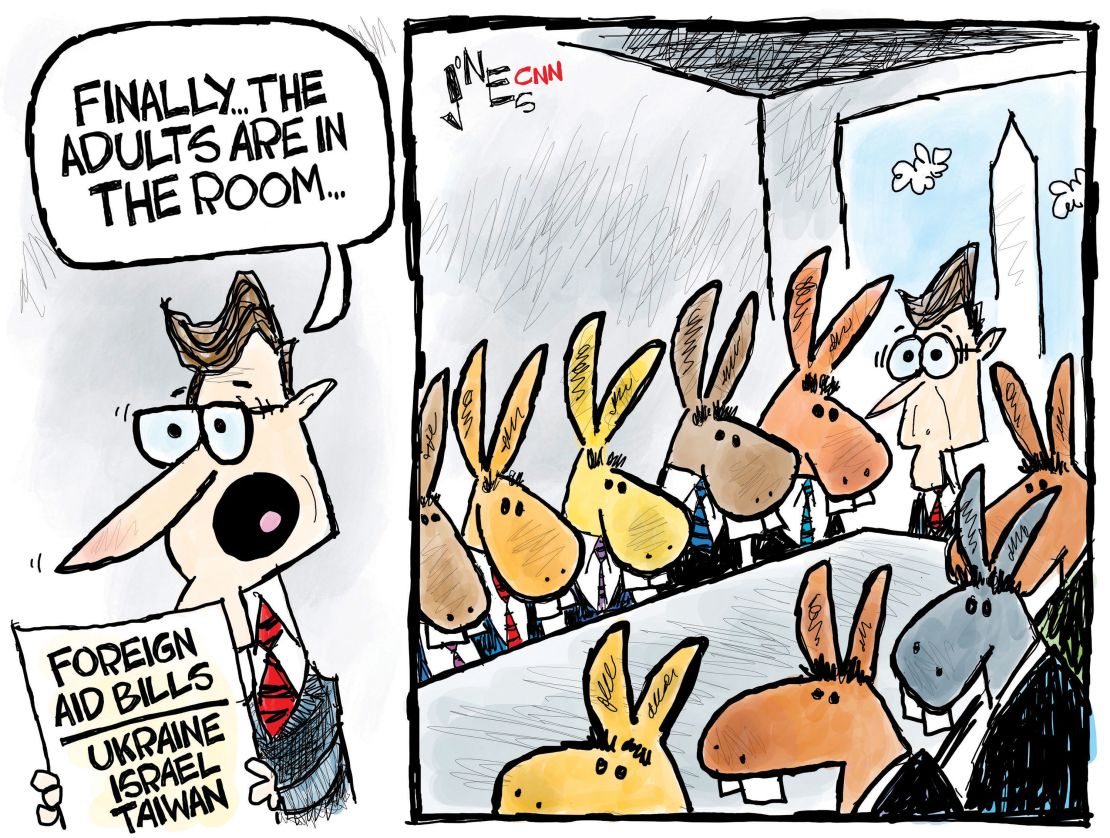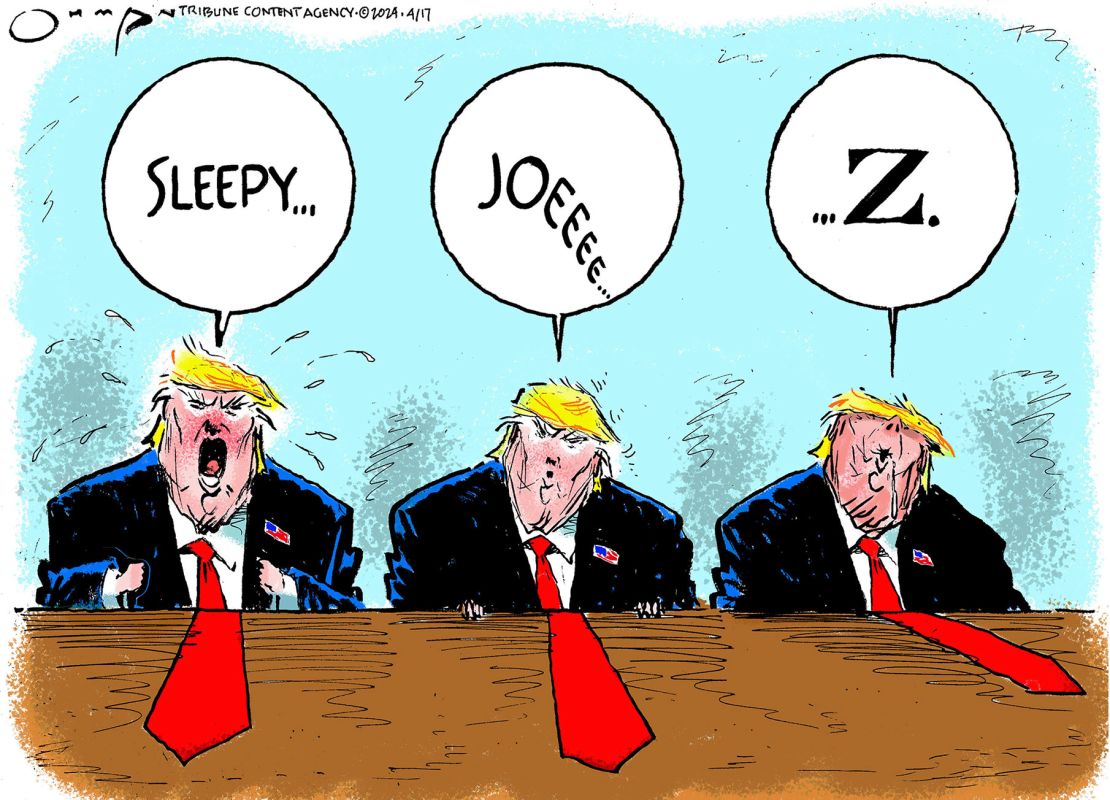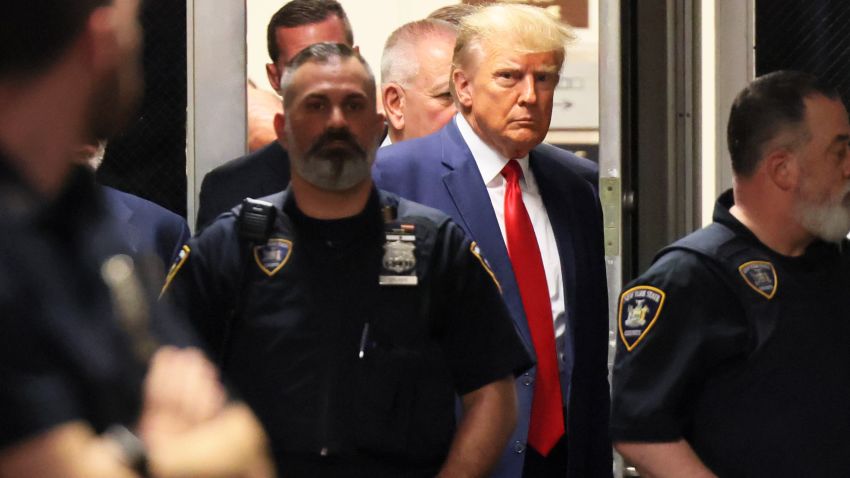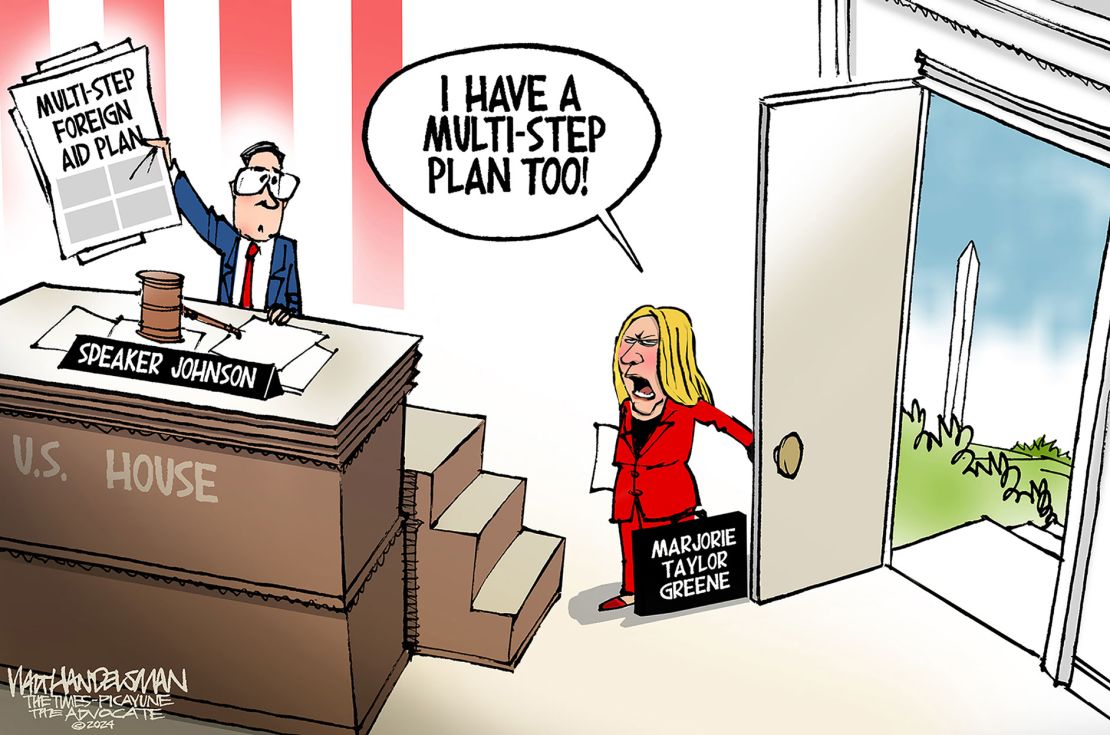Editor’s Note: Sign up to get this weekly column as a newsletter. We’re looking back at the strongest, smartest opinion takes of the week from CNN and other outlets.
CNN
—
“We are most deeply asleep at the switch,” wrote Annie Dillard, “when we fancy we control any switches at all. We sleep to time’s hurdy-gurdy; we wake, if we ever wake, to the silence of God.”
Dillard’s line — from her short meditative book titled “Holy the Firm,” published in 1977, two years after she won the Pulitzer Prize at the age of 29 — invoked the role of the switchman, whose alertness was crucial in making sure trains got routed on the right track before the advent of automated switches.
If America’s political leaders control any switches at all, some have been asleep at the switch for a while. When the Senate voted to send new aid to Ukraine, Israel and Taiwan two months ago, House Speaker Mike Johnson took no action. The House leadership also refused to act on a bipartisan bill to address the surge of migrants across the southern border.
In both cases, Republicans in Congress were partly heeding the wishes of former President Donald Trump, who opposed more aid for Ukraine and wanted to prevent President Joe Biden from scoring any more legislative victories.
That was weeks before Trump went on trial in a Manhattan courtroom, where the man who labeled Biden “Sleepy Joe” appeared to doze off several times Monday and Tuesday while the court started the process of selecting jurors.
And it was also well before Iran directly attacked Israel for the first time. Israel responded, and while those strikes appeared to cause only limited damage, it showed the potential for wars to spiral out of control and made it even less politically tenable for the House leadership to be seen stalling on military aid measures.
When a defendant nods off, it doesn’t stop a trial from going forward. When a nation naps in the middle of international crises, the consequences can be profoundly scary.
Last week, Johnson finally acted, making clear he supports the foreign aid package, though he broke it up into four bills and added a fifth on border security. With the help of Democrats, the House approved aid to Ukraine, Israel and Taiwan on Saturday. “Despite fierce opposition from MAGA Republicans within his caucus, Speaker Johnson has decided that the imperative of the US providing this assistance is more important than pleasing all the members of his caucus,” wrote Julian Zelizer.
“Without this support, international adversaries, including Russia, Iran and China, would read the failure of the US Congress to pass legislation as a sign that MAGA’s America First agenda was triumphant. They might conclude that the age of internationalism, entrenched into American politics since World War II, had come to an end.”
“The problem for Johnson is that his decision to move forward might very well cost him his job,” added Zelizer, noting Rep. Marjorie Taylor Greene’s fierce criticism of Johnson and a House rule allowing just one member to bring about a vote to oust the speaker — which led to Kevin McCarthy’s downfall six months ago.

Biden backed bipartisan legislation on the border, but in the view of Fareed Zakaria, he has missed an opportunity to take firm executive action after House Republicans scuttled the bill and launched the doomed effort to impeach and remove Homeland Security Secretary Alejandro Mayorkas.
“Biden must show he can fight. He should declare a national security emergency, send the National Guard to the border, work with Congress to suspend the asylum process and propose a new one that basically makes it impossible to get asylum if you just show up at the border,” Zakaria wrote.
“Many will scream, and it will all be challenged in court. But it will signal that Biden is taking the problem seriously. Bill Clinton often says that the American people don’t always need you to succeed, but they want to catch you trying. Joe Biden needs to be caught trying to solve the immigration crisis.”

Donald Trump’s campaign denied reports that the former president dozed off several times in court last week. But no one should be surprised at the sight of a criminal defendant seeming to nod off, noted Elliot Williams, a former prosecutor who has logged countless hours in court.
“Courtrooms don’t lend themselves to keeping people awake. They are notoriously quiet places where people are required to remain seated almost all of the time. The air is often stagnant and the ever-so-distracting handheld devices that are our lifelines to (and barrier from) the world around us are strictly forbidden … the gears of justice are not made for the 24-hour news cycle. What might be resolved in an 8-minute final segment of an episode of ‘Law and Order’ might be drawn out over days of painstaking testimony. It can take months, if not years (even in cases in which a defendant is not deliberately attempting to slow proceedings down) before a matter finally gets to trial.”
Still, the selection of the jury that will pronounce a verdict on the hush money trial moved faster than expected last week. There were speed bumps though, as Patrick T. Brown noted.
“One potential juror who underwent questioning … was subsequently struck for cause after Trump’s team found social media posts from the juror referencing Trump that say, ‘Get him out’ and ‘Lock him up.’”
“Indeed, it seems unlikely that this case would be being prosecuted with the same vigor and creative legal theorizing if Trump were an everyday citizen. After all, Manhattan District Attorney Alvin Bragg came into office promising to focus on the ongoing investigation of Trump, and would have likely felt political heat from New York Democrats had he decided to close the investigation without bringing charges.”
“In the end, as The New York Times reported in March 2023, Bragg’s office took a ‘circuitous and sometimes uncertain road’ to filing criminal charges, reviving a dying investigation that originally focused on Trump’s business practices with a renewed focus on hush money payments.”
Will the trial be fair? Jeffrey Abramson, author of a book on the jury system, noted, “Impartiality is the key to jury justice, but we can hardly expect jurors to approach the case without strong opinions about Trump. Indeed, it would be disturbing to seat jurors whose only qualification was their ignorance about major news events of the day.”
“Fortunately, an open mind does not require an empty mind. We can find fair jurors who understand the difference between law and politics.”
Don’t call it a hush money trial, urged Norm Eisen.
“The core issue … is not the payments to adult film star Stormy Daniels in October 2016 to conceal her claimed affair with Trump (he denies the affair took place). The core issue is why Trump made them.
“Paying hush money by itself is not a crime. The crime alleged in this case is felony document falsification, as the judge detailed. That requires intent to conceal, aid or commit another crime. Here, the prosecution alleges that the intent was to violate federal campaign finance laws and also the state statute prohibiting the ‘unlawful influence’ of an election — i.e., election interference.”
“No one can seriously dispute,” Eisen concluded, that the reason former Trump fixer Michael Cohen and Trump himself “allegedly hatched the scheme was to deprive voters of information that could have changed the outcome of an extremely close election.”
For more:
Elie Honig: Which case is the biggest threat to Trump?

Elie Honig: Which case is the biggest threat to Trump?
Iran and the unimaginable
The unimaginable is not a theory, wrote Frida Ghitis. It can happen. That was one of Ghitis’ five takeaways from the Iranian attack on Israel.
“Israel and Iran have fought a shadow war for decades. The notion that one day Iran would launch a direct attack against Israel may have seemed like a distant possibility: something that was bound to happen, but only at some elusive future date. The same was true of Hamas, a terrorist group that seized control of Gaza. Israeli Prime Minister Benjamin Netanyahu thought he could appease Hamas and preserve quiet in Gaza and safety for Israelis living in the south. Others worried that one day Hamas would attack with full force. Many have worried that Iran will one day attack with full force. October 7 and April 14 are reminders that the unimaginable, the barely-imaginable, can and does happen.”

Peter Bergen wrote that “Saturday’s drone and missile attacks against Israel were designed to show Israel and the region that the Iranian regime can’t be trifled with, and the Israeli attack on its military leaders in Damascus would be avenged. However, it might not trigger a major war since 99% of the 300 drones and missiles launched by Iran were intercepted, according to the Israeli military. It’s likely that Iran’s theocratic regime, which has faced major internal protests and is approaching a generational transition, wanted to respond to calls for retribution for the Damascus attack without triggering a major war with two superior militaries — that of the US and Israel.”
For more:
Daniel R. DePetris: Biden needs to bring US troops back from Iraq, now
Dean Obeidallah: There’s no excuse for ‘death to America’ chants, and Dearborn agrees
Susanne DeWitt was smuggled out of Nazi Germany by a Christian woman and settled in Berkeley, California, 65 years ago. “I have occasionally encountered antisemitism,” she wrote, “but these one-off incidents never succeeded in destroying my spirit.”
“But since the October 7 Hamas attack on Israel, the hatred towards Jews that I have seen in Berkeley terrifies me more than anything I have experienced while living here. I am still reeling from being called a liar at a Berkeley City Council meeting, where I asked for a proclamation to mark Holocaust Remembrance Day and spoke about October 7. The Jews at that meeting were circled and called ‘Zionist pigs’ by menacing protesters.”
“We are approaching the holiday of Passover, which commemorates the freedom of the Israelites from Egyptian slavery and our formation as a free Jewish people in our own land. But this Passover is like no other in recent history, with scores of hostages still held in Gaza and Jews worldwide fearful for our future — including Jews in the US. We are facing the worst global antisemitism since the Holocaust and while it is not state-sanctioned as Nazism was, it is a threat going unchecked in California’s East Bay.”
David Schizer, who co-chairs Columbia University’s task force on antisemitism, testified before a congressional committee Wednesday, along with the university’s president. Writing for CNN Opinion, he emphasized that there are legal principles that require universities to prohibit expressions of antisemitism.
“Of course, the mission of a university is not merely enforcing rules but providing an education,” Schizer noted. “Over time, opening minds with facts and analysis is the best defense against antisemitism and other bigotry. But to allow this educational process to flourish, we need to build it on a foundation of laws that are respected and enforced.”
Nike came in for sharp criticism due to the design of Team USA’s new Olympic track and field uniforms. “Unlike the men’s uniform — a standard compression tank top and mid-thigh shorts — the women competitors repping the so-called ‘land of the free’ will be donning a compression tank top and bikini bottoms with a noticeably high cut up the thigh,” wrote Danielle Campoamor.
Interest in women’s sports is at an all-time high, thanks to superstars like Caitlin Clark and Simone Biles, Campoamor noted, “and despite all the excellence of women’s sports, Team USA decided to send a resounding message to their athletes, our country and the world: You are viewed as a woman expected to perform for the male gaze, not a medal, way before you are viewed as an athlete. You must be sexy before you can be powerful. You must appear feminine before you can appear athletic.”
Six people — five of them women — were killed in a stabbing attack at a mall in Sydney. “Multiple people, including a new mother, slaughtered in daylight in an affluent suburb is something Australians read about in the news when it happens in other countries,” wrote Latika Bourke.
“Rarely does it occur in their backyard. When it did in 1996 after the Port Arthur Massacre when a lone gunman killed 35 people, then-Prime Minister John Howard, a Conservative leader, acted — with bipartisan support that has remained rock solid ever since.”
“He enacted strict gun control laws and initiated a massive buyback scheme. He had to stare down political opposition from his own supporters at the time, but his tough stance has been vindicated by the lack of mass shootings ever since.”
“But restricting public access to weapons with the capability of mass lethality cannot stop hateful ideologies mixing with other noxious ingredients including radicalization and mental health issues.”
“This includes misogyny.”
For more:
Justin J. Pearson: I was expelled from the Tennessee legislature for advocating for gun control. They still don’t get it

As Holly Thomas pointed out, former UK Prime Minister Boris Johnson is no fan of his successor Rishi Sunak’s move to eventually ban all smoking in the nation.
“The party of Winston Churchill wants to ban (cigars)?” he moaned. “Donnez-moi un break, as they say in Quebec. It’s just mad.”
Thomas wrote, “Under the proposed bill, no one born on or after January 1, 2009, would ever be allowed to buy tobacco, effectively raising the legal smoking age every year. This would mean today’s 15-year-olds will never legally be able to buy cigarettes.”
“Despite what Johnson may have led his audience to believe, a potential smoking ban enjoys broad popular support in the UK. A February survey by YouGov for the charity Action on Smoking and Health found that 71% of adults backed the goal of making Britain a country where no one smokes (12% are opposed). Like most people, I’m certain this would save many lives and relieve a massive strain on the National Health Service (NHS). Whether that goodwill proves sufficient to overcome the many obstacles still ahead remains to be seen.”

David M. Perry: The FAFSA fiasco is a huge problem for students and colleges
Frankie de la Cretaz: Caitlin Clark and Angel Reese are in the WNBA now. Stop telling them to ‘play nice’
Roy Schwartz: She was immortalized by Joni Mitchell — and if you love comics, she touched your life
Raul A. Reyes: The problem with calling on Justice Sonia Sotomayor to resign
Jules Boykoff: We all lose if the Olympic surveillance state becomes the norm
Jaime M. Yassif: What worries scientists like me about bird flu
Aditya Valiathan Pilai: The Indian election issue that will impact the world
Ed Manning: What I didn’t know about my prostate almost killed me
Sara Stewart: It’s time to change the way we think about sociopaths
Noah Berlatsky: ‘The Ministry of Ungentlemanly Warfare’ has a surprising secret
AND…

Amy Bass bonds with her teenage daughter over their mutual fascination with Taylor Swift. They’re looking forward to attending a concert later this year in Vancouver, perhaps their last mother-daughter trip before college. So they were both on the alert at midnight Friday, when Swift dropped her new album, “The Tortured Poets Department” and again at 2am when she released a surprise second half of what turned out to be a double album.
“It’s one thing to be a puzzle to your fans — it’s entirely another to make a puzzle for your fans,” Bass wrote. “Swift has created music’s version of ‘I Spy’ novels for this generation, encoding notes in her lyrics, creating everything from complex numerologies to word searches. The relentless hunt for Easter eggs across social media suddenly took physical form in this exhibit: from the 72 (the number of months Swift was with (Joe) Alwyn) card catalogue drawers, six (the number of years Swift was with Alwyn) of which are open and filled with lace and dead flowers to a bust of the goddess Diana, the original statue crumbled on its way to London in the 6th century because of neglect. ‘Even statues crumble,’ Swift’s TTPD billboard says in New York’s Times Square, ‘if they’re made to wait.’”
There’s numerology in the Swiftie world, but also history. Swift sings of figures such as silent screen star Clara Bow, Welsh poet Dylan Thomas, singer-songwriter-poet Patti Smith — and of something called a “typewriter.”
Credit: Source link




